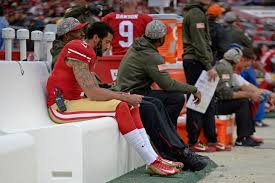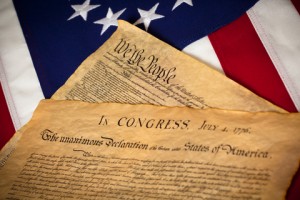 I have a complicated relationship with the Pledge of Allegiance and other nationalist rituals like singing the National Anthem, so I was hoping the whole issue stirred up by San Francisco 49er’s Quarterback Colin Kaepernick would go away quickly. Its too difficult of a conversation to have on social media, where nuance goes to die. Yet, I found myself itching to have a go at it. Had it just died on the vine after it started, I could have left it alone. But as other players and even non-athletes continue to join or approve of his protest, combined with another story I keep seeing in my feed about a Native American public school student in California, Leilani Thomas, who sat for the pledge having her grades lowered, I feel the need to talk this one out. I assume I’ll get criticism from all sides of this debate, which is a slot I’m familiar with.
I have a complicated relationship with the Pledge of Allegiance and other nationalist rituals like singing the National Anthem, so I was hoping the whole issue stirred up by San Francisco 49er’s Quarterback Colin Kaepernick would go away quickly. Its too difficult of a conversation to have on social media, where nuance goes to die. Yet, I found myself itching to have a go at it. Had it just died on the vine after it started, I could have left it alone. But as other players and even non-athletes continue to join or approve of his protest, combined with another story I keep seeing in my feed about a Native American public school student in California, Leilani Thomas, who sat for the pledge having her grades lowered, I feel the need to talk this one out. I assume I’ll get criticism from all sides of this debate, which is a slot I’m familiar with.
Let me get this out of the way. The First Amendment allows us the ability to speak and express ourselves however we want (without physical violence) free of censorship from the government. This does not grant us freedom from criticism, or consequences for those views (as long as its not the government punishing us as is the case against that CA student). Speech we disagree with is best combated by the counter-speech we do agree with. If you’d like to know more about the distinction between government censorship and criticism by the average person, Popehat’s “Hello, You’ve been referred here because you’re wrong about the first amendment” is a great read. I do believe that we all need to do better to foster the spirit of free speech, therefore shouting down someone you disagree with rather than engaging them in calm debate is counterproductive and wrong, and that punishing someone for their speech (like an employer censoring, or firing someone, or you boycotting a business) should be undertaken with extreme caution. Speak with your “enemies” and try to convince them through rhetoric, or at least get them thinking about something they may have never thought about before you try to humiliate them, or destroy their lives.
Ok, I hope that is fairly clear. Now, back to my complicated relationship with patriotism.
I love singing the National Anthem. I love all the feels it gives me. I love the ritual of standing, removing a hat, placing hand on heart. I love the swell of the music. I love the challenging range (I usually have to switch octaves as I’m a solid baritone-alto). I love that the lyrics include a line about rockets (which can be conveniently timed with real rockets going off). I love the picture that is painted by the poetry. I love the hope and inspiration it gives me as I imagine that flag waving through all the chaos of battle. I feel similarly about the flag it self. I believe almost always in showing respect for what the flag represents, especially if I am surrounded by veterans who consider it a sacred embodiment of the sacrifices they gave and their brothers and sisters gave, some with their lives. I love the theater of it all. I love the whole thing.
But… I also think pledging allegiance to a flag, or any inanimate object, is silly. A flag cannot do anything for you. Its a piece of cloth. Its a symbol of things, not the things themselves. But I would take it one step further. I think pledging allegiance to anyone or anything is silly. More than that, I feel its dangerous. Allegiance is beyond loyalty, which can also be tricky. Allegiance means whatever it takes, you hop on board the train of obedience. It is blind allegiance to a country, a king, a ruler, a government, or a flag that can lead to atrocities committed in the name of those things by unquestioning followers. I never want to allow a pledge I made as a child under extreme peer pressure to determine the course of, or to define, my patriotism.
And I am a patriot. I believe strongly in the ideals this country was founded upon. I believe in the idea of self-determination. That all men (and women) are created equal, endowed by our creators (whatever you want that to be) with inalienable rights to pursue happiness, be free, and to live unmolested by any one or any group (government included). If I were to pledge fealty, it would be to those ideals, not to the government, and not to a piece of cloth.
But, for me, there is a difference between the Pledge of Allegiance and the Star Spangled Banner, which leads me to one of my criticisms of Kaepernick and his like-minded protesters. Let me first explain the differences before I reveal the criticism. The Pledge of Allegiance is, at its core, anti-American. I would never call a person who wants to pledge freely un-American, that is their free choice, but the concept of the pledge itself to me is strikingly antithetical to the idea of individual free expression. Its intent is to strengthen nationalism so that even the idea of questioning the Pledge is seen as subversion. It is disturbingly similar to rituals dictators in totalitarian regimes demand of their captive citizens. These rituals usually begin by indoctrinating children before they can really questio n the idea of what it means to be a patriot. It is an irony that the Pledge gained a resurgence during the 1950’s (when the “Under God” clause was added) as a response to the Cold War and anti-communist witch hunts. To me, being a patriot is upholding the ideas enshrined in the Constitution and Declaration of Independence, and in the philosophy of individual self-governance that came before them, and has been refined since them. The idea that each of us has but one life to give, and it is our own so long as we are peaceful. The Pledge teaches us the opposite. It teaches us how to collectivize our thoughts. It teaches us to speak by rote memory, without thinking about or necessarily believing in the words.
n the idea of what it means to be a patriot. It is an irony that the Pledge gained a resurgence during the 1950’s (when the “Under God” clause was added) as a response to the Cold War and anti-communist witch hunts. To me, being a patriot is upholding the ideas enshrined in the Constitution and Declaration of Independence, and in the philosophy of individual self-governance that came before them, and has been refined since them. The idea that each of us has but one life to give, and it is our own so long as we are peaceful. The Pledge teaches us the opposite. It teaches us how to collectivize our thoughts. It teaches us to speak by rote memory, without thinking about or necessarily believing in the words.
But the National Anthem is different for me. The Anthem is a celebration of those ideals this nation was founded upon and strives to achieve. Its a recognition that one man watching a battle from afar can be moved to inspire others simply by writing powerful words. Its a recognition that while we have never perfectly implemented the ideals the Founders fought for, we keep striving for them. The Anthem should always be optional for free citizens, but it doesn’t demand our loyalty. It only reminds us of what is worth fighting for.
That is where Kaepernick has it wrong. There are serious problems in America. No reasonable person can doubt that. But the country is vast, and has also come a long way from where it began. The lives of the people of color killed by police that he is protesting cannot be served justice by protesting the beautiful goals for the country our symbols, in particular those represented during the singing of the National Anthem at a sporting event, represent. Protest the individual police departments that have done wrong. Protest the politicians who enacted specific policy (or who fail to do so) that lead to some of the unjustices. Protest the specific racists who keep us all in the past. Agitate for legal reforms. Give your time. Give your money. But don’t protest the vision. Don’t protest the idealistic dream of liberty and justice for all. Don’t protest the brave Americans who have risked and sometimes lost their lives to push us one step closer to realizing those goals encapsulated in our symbols. It makes no sense, and will have no measurable effect except to make those locked in solidarity with you feel like they are doing something. They are not. Nothing meaningful will come from sitting or kneeling during the Anthem. In doing so, “protesters” are only helping to conflate the idea that our dreams are the same as our reality. The Anthem and our symbols represent the end game. The goal we’re hopefully all wanting to achieve. They don’t represent when we stumble, and fall down, and slide down the moral arc of justice a few notches.
I have a dream. My dream is that while I would fight to the death for Kaepernick’s right to protest, I wish that he would realize he’s only further dividing us when we need the common bonds the Anthem symbolizes the most.
Peace,
PersephoneK
P.S. Dear Mr. Kaepernick, you basically render your opinions about oppression and state violence moot when you wear a t-shirt supporting Fidel Castro. Please try googling stuff about him. Hint: He’s a viscous, murdering dictator.

